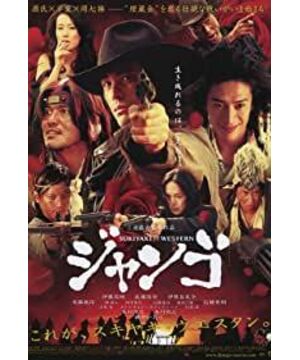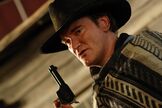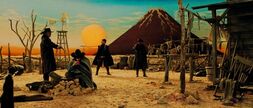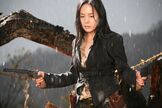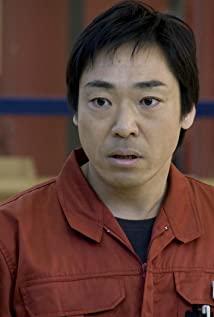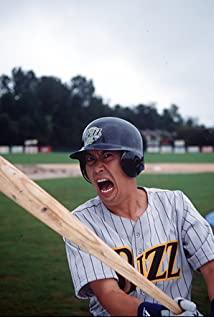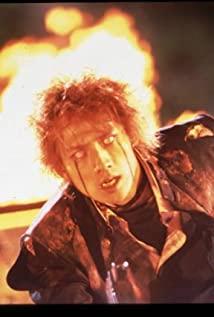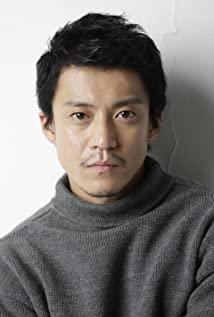"Sukiyaki Western" is Takashi Miike's remake of Sergio Cobucci's "Django" in 1966. In the old version of the film, a gunman named Django came with a coffin. Go to the desolate town where the Ku Klux Klan is at war with the Mexicans. The former is wearing a scarf-colored face mask and headscarf, and the latter is wearing a Mexican hat and will immediately attack the world.
After the background was moved, Miike placed the story in Japan hundreds of years after the Battle of Tannoura in 1185. The Heike and the Genji family later continued the battle to a certain deep mountain town due to rumors that they had treasures. One day, a lone gunman of unknown origin stepped into the place, making the situation even more complicated.
"Sukiyaki Western" has a strong lineup of first-line Japanese stars, and all the actors have been trained in advance and use all English dialogues-some people have expressed concern about this. In "Memoirs of a Ghost Trick" in the "Master of Horror" series, some foreign audiences complained that "Japanese English" could not be tolerated.
In the film, Miike uses red and white as the identification credentials for the respective camps of Heike and Genji in the film. But this is not because he painted the gourd in the same way and turned over the old film as it is, but there are historical records to test. In the book, "All the flags used by the Heike family are red flags, and the red light shines on the sun. The Yuan family's flags are all white, and the wind is blowing, which is spectacular and boosts their morale." The origin of the song.
In addition to the theme variations and necessary changes, the preserved materials include mysterious coffins, ill-fated beauties, and piles of gold that are related to interests. In addition, the "Gate of Hell" and the cross, two very different cultural symbols of the East and the West, appear together, emphasizing the special meaning of a "mixed western".
Western films and sword and halberd films have a deep relationship, and in different periods and in many places, they have learned from each other. In addition to "Django", the other side of "Sukiyaki Western" is close to Akira Kurosawa's "Heart Stick". The difference is that in the old film, only Tatsuya Nakadai uses the gun alone, while in Miike's Western, in addition to using the gun Iseya Yusuke of the sword, guns are almost necessary for everyone. Who will stick to the end becomes a question mark.
To put it calmly, looking at the world film industry, Takashi Miike is already a well-deserved and unparalleled energy madman. There is a saying that the viewing speed is not as fast as the production efficiency of this gentleman, and the high output is much more valuable. What is commendable is the good level of cult flavor. With "Sukiyaki Western" being shortlisted for the competition at the Venice Film Festival, Miike proved with facts that every attempt he made is worth the expectations of fans - even if sometimes he would go too far when he played his cards unconventionally.
Although the Italian media did not score highly at the Venice Film Festival before, the current film has a good response at the Toronto Film Festival, and it belongs to the "favorite type of movie fans" (especially Miike fans). Simply put, "Sukiyaki Western Movies" looks cool, dazzling, gorgeous, nostalgic, charming, exciting, and has a strong western flavor. Miikeji Sukiyaki begins after Quentin screams in the sky, praising the deliciousness of Sukiyaki
.
If you want to establish a special judgment, it is not easy to draw a conclusion to find out who Miike’s sukiyaki (Japanese hot pot) is imitating, and what condiments are added besides beef, tofu, and vegetables. At the end of the film, the child goes to Italy and becomes a child named Django, making fun of the mutual connection between Akira Kurosawa and spaghetti westerns - basically the content is true. The makeover of a large number of scenes in it also presents a bizarre and bizarre effect. Ordinary audiences can't see the shadow of Django, but it should be easy to recognize which movie Kagawa Zhaozhi, who has fallen into self-splitting, is reproducing. Where did the momentary changes in the weather during the pick and gun duel come from?
"Sukiyaki Western" lacks the fate of the lone gunman in "Django", and the ending is also less thrilling. On the basis of the humor of "Intentional Stick", there are more vulgar jokes with modern tastes, and some detail settings really make people want to pull out Michi and make a big mouth. In the war between Heike and Genji, taking out the raw materials related to Shakespeare further explained the intention of Miike, which is a spoof. Therefore, the gunfight may not be hot enough, and the plasma is not allowed to fly, but crazy spoofs are very necessary.
Afraid of death, Ping Qingsheng dreamed of the final victory every day. In the background of the Red and White War, a rose that can bloom red and white flowers blooms. Whether it is deliberate or not is not particularly important. After all, this is a Japanese film with a western shell. Just like how Jnglish in Miike's work has progressed after "Memoirs of a Ghost Man", the important thing is that Miike did it. The bizarre set decoration, the carved bar door, the interior lighting, and the lighting of the memory passages are all novel effects. It is enough to use everything that can be used together, just like a bunch of ancient Japanese speaking strange English. For example, Masanobu Ando, who once again took over the perverted character, had nothing to do with Su Ri's shyness, and licked blood frantically after getting his hands on it. As for the effective action of falling in love with the master after losing an important part, I am afraid that the director just vented his anger for the audience and solved the terrifying appearance of Shiqiao Guiming.
I doubt whether I can understand the meaning of the existence of the character of Hideaki Ito without a certain background knowledge. If I can't do it, I should treat it as a comedy film. Anyway, the cold jokes are not necessarily less than other Miike works. QT is still not enough after a frenzy of eating and criticizing cooking skills, and he has to educate a female killer, just like the western version of the white eyebrows in "Kill Bill". The old man in wheelchair appeared. Compared with the white eyebrows who are inhumane and abusing the female disciple, the QT student is kind and loving, and the hands that caress and caress make me feel ashamed. In short, the story is layered up like this, legend, story, western, sharpshooter, female killer...
In "Ping Henry" and "Cut the Watermelon", it can be said that the whole story has not entered the state, and it is not funny enough. When it came time to sacrifice the coffin book of the old movie, the story suddenly exploded. A heavy gun took out the tediousness of the previous conversations, smoking cigars and throwing explosives on the rickshaw was so fun, Yuan Yoshitsune turned out not to be cool with guns but to play parabolic shooting, the poor little brother witnessed Brother Henry save his life Trick to die tragically. The interest brought by these passages and different methods of death cannot be clearly expressed by a retelling. The ancient battle of Heike Genji has blossomed into the evil flower of the west today.
In the name of sukiyaki, Takashi Miike made his own westerns, just like the innovations achieved in the horror film "Love to the Skin" or the children's film "Monster War"—breakthroughs that were not in the name of technological innovation. In fact, his remake is based on his personal style, not the old Italian version. The key protagonist, the sharpshooter, is on the front line. "Sukiyaki Western Movie" is a combination of "Django" (the gunman was seriously injured until the cemetery battle), "Heart Stick" (Mifune reappeared in the town with a mighty atmosphere), After being stomped on, he was treated, and after his comeback, it was like possessed by a god. The themes of educating the younger generation and sublimation still failed to improve the three-dimensional level of the characters. The gunman came and went like the wind, the red faded, the white was vast, and he disappeared into a dead town.
http://www.mtime.com/my/moviel/blog/959400/
View more about Sukiyaki Western Django reviews


